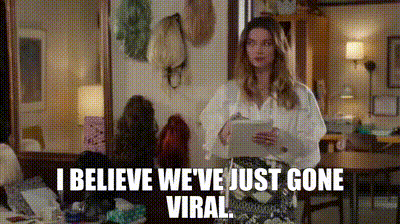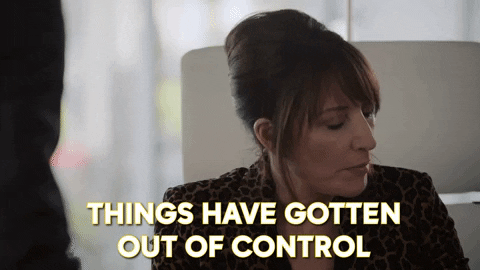Terms & Conditions, Mascara & Truck Driving
5 in 5 - Brave & Heart HeartBeat #164 ❤️
This week we’ll be talking terms and conditions, mascara, and truck driving – an eclectic mix, if ever there was one.
What do these things all have in common? As always, they can teach us more about the worlds of tech, marketing, and the people and strategy behind all of it.
We’ll be encouraging you to read the small print, asking what really makes something viral, and dissecting the latest downward spiral in Elon Musk Land. We’ll also be finding out what makes lazy girls tick, and how is going into the office like a workout?
Were you forwarded this? Not a subscriber? 👉 Sign up here
#1 - Legal Lullabies
Have you ever read the Terms And Conditions, of anything, ever?
Us neither, but in the Internet age maybe we should make a point of finding out what they actually say, especially with the advent of AI and the data mining.
We say advent, as long as ago as 2018 Wired ran a story about Facebook using the images posted on their apps to train AI systems. The data across apps like Instagram, WhatsApp, Messenger and the Facebook app was described as a valuable asset in training AI to recognise images, as the images, especially on Instagram, were labelled with descriptions.
Chances are your images have been used to train AI models somewhere, whether you posted them on Shutterstock or Instagram, and while the site Have I Been Trained allows you to check if your images have been used, it’s not easy to opt out.
Black Mirror spoiler alert, in the famous Joan Is Awful episode, Joan’s life is turned into a Netflix series in almost real time. She didn’t realise it, but she had agreed to this in the terms and conditions of her social media accounts and smart phone, which was filming and recording her every move to generate content using AI.
Actors are currently striking about it, not sure what Charlie Brooker has to do with that if anything, and it has gotten many of us thinking about the Ts and Cs we take no notice of. Especially as Instagram updated theirs at the beginning of this month, which was (conveniently?) overshadowed by the release of Threads.
The Lazy Data Research Institute noticed, however, and set about creating an easier way for us to digest this information. They’re a Swedish artistic collective who aim to make complex data accessible to the average person, and have therefore created “Legal Lullabies”.
They asked a friend with a particularly pleasing voice to create a sleep aid podcast where he reads out the Terms and Conditions. They have two episodes right now, a 51 minute long Instagram version, Zzzuckerberg; and a 38 minute long TikTok version, titled Zzzhang.
For the record, they think Instagram’s is worse, and described parts of it as being so incomprehensible they felt like a “fever dream”.
So if you still can’t be bothered to read them, why not listen to them?
Night Night, Sleep Tight
#2 - The “Viral” Mascara Ad
This last week there’s one ad that everyone has been talking about, but the jury is out on whether it’s a good piece of marketing or not.
You may have seen the videos, a London bus and a tube, both with eyelashes sticking off them like they have a little eye, being driven past a mascara wand stuck to the side of a gorgeous building and a billboard respectively. The eyelashes bounce, the wands are huge, it looks cool.
It objectively looks really cool, it’s a genius idea and very creative, but the divisive thing about it however is, it’s not real. The ad was created using CGI, and shared on TikTok, where it apparently went viral.
Now, the definition of going “viral” should probably be tweaked now that we have TikTok and it’s incredibly specific algorithm. By going “viral”, we don’t know if this video was shared organically, who was paid to share it, and if it had a wide reach or simply appeared in the feeds of people who already love makeup videos.
While we can’t find the data to prove this, TikTok is very cagey about that sort of thing, we suspect it’s the latter, which makes this ad, while genius and visually gorgeous, a little bit like shouting into a closed room.
It did get a lot of traction on LinkedIn, but again, those people were critiquing the ad rather than being influenced by it. The closed room effect strikes again. A lot of those marketing professionals were lamenting the fact that this video was made with CGI, and didn’t actually happen.
If Maybelline had actually put eyelashes on public transport in central London, and people had actually seen it and thought wow, that’s cool, and then shared it online themselves – THAT could be defined as going viral.
Just because it’s online, doesn’t make it viral. Out Of Home advertising is being increasingly digitized, think those fake billboard images we’ve seen so often on Twitter, but digital OOH marketing just doesn’t have the same reach.
Think about that person who’s never heard of your brand just walking past minding their own business who would have seen and been wowed by the giant mascara wand – you’re not reaching them on TikTok.
#3 - Elon Musk Is Spiralling
This does not come as a shock, but it is objectively shocking. Elon Musk is completely spiralling out of control, if he ever was in control.
He continues to redefine the boundaries of how a public figure should behave on the social network platform that they own, by calling Mark Zuckerberg a variation of the c word we won’t be publishing, and suggesting they literally measure parts of their body against one another. Three guesses as to which part he’s referring to.
He then went on to seemingly bounce business ideas off his followers, because that is the best way to run a company, by suggesting they bury Instagram once and for all by introducing an images tab. Hilarious.
While this idea was heralded as genius by some of his fans, it probably wouldn’t work to bring people back to the platform. We’ve all come to understand that all of the worst people are on Twitter, and everyone else is on Threads – whether they’re using it or not.
In another confusing move, rather than paying the 500 million dollars they’re being sued for by laid-off employees, Twitter have begun sending cheques to content creators they see as deserving.
Or, as Insider noted, rewarding his favourite trolls. One of which being Andrew Tate, of toxic masculinity, fighting with Greta Thunberg, jailed for human trafficking fame, who reportedly received 20,000 dollars.
Honestly, we’ll just let that one speak for itself.
Why Pay Your Staff When You Can Literally Pay Criminals To Post Hate Speech
#4 - Lazy Girl Jobs & Truck Driving
There is a new TikTok buzz term in online workplace lingo – Lazy Girl Jobs.
The term refers to undemanding - usually office based - jobs, with little personal passion involved, that allow the employee in question to take home a comfortable salary without much work or ambition involved.
The hashtag has been viewed 14 million times, and almost all posters are women, and Gen Z. The generation who saw the rise and fall of the side hustle, and the Girl Boss, and who live quit their jobs on TikTok.
Much of Gen Z are staunchly anti-hustle, with only 49% of Gen Z saying work is central to their identity in comparison to 62% of millennials, and “Lazy Girls” on TikTok stating that they’d rather carve out a life outside of their professional persona, than devote “40 years to a boss who’s paying what they think is fair”.
While this TikTok phenomenon is largely only women, the author of the recent Guardian article on the topic notes that there’s no male version of “Girl Boss” either, women aren’t the only ones choosing a “chill” job. An interesting article about an Australian CEO who gave it all up to become a truck driver after experiencing delayed burnout, simply because he enjoys driving, shows that any age and gender can feel the need to pull away from the corporate world.
It also seems clear that a toxic workplace culture, glamorised for Millennials, has no allure to Gen Z, and rightly so.
Attracting Gen Z to the workplace and motivating them to thrive within it will take a lot of work from the inside in order to ensure toxic workplace culture is no longer the norm.
#5 - Is Going Into The Office Like Working Out?
As in, we don’t want to do it, but it’s good for us, and we feel better when we do?
That’s what a recent opinion piece in The Guardian, who famously have a lot of anti-work from home journalists (one of which got our back up when as an upper middle-class man living in central London he couldn’t understand why not everyone wanted to spend all their time in the office like him), seems to be suggesting.
The author notes that depression, anxiety, stress and isolation are all on the up since we’ve continued to work from home after the pandemic originally forced it on us, with a reported 80% of UK workers feeling like home office is bad for their mental health.
Going into the office is annoying, it takes more time, more effort, but do we feel better for having actually seen our colleagues, talking to real people and making time for some chatter around the coffee machine which makes our jobs seem a little bit lighter, and less like an endless to-do list that we carry out alone at home?
The author gives the example of a friend of hers who is annoyed when he has to go into the office for an unavoidable meeting, but when he does comes back refreshed and vows to do it more often, before continuing to work from home and getting up just in time for his first zoom of the day.
Like those of us who go for a run, and think “hey this actually feels good I’m going to do it more often”, but then end up stuck back on the sofa eating m&ms and watching Netflix. We know deep down the run is better for us, but staying on the sofa is easier, and habits die hard.
It's an interesting idea in support of hybrid working, if not bringing the office back. One which has to be taken with a pinch of salt and the understanding that for some people, remote work truly does fit their lifestyle and their working style better, but interesting, nonetheless.
Brave & Heart over and out.
Bonus
Musk Launches AI Company
We couldn’t even be bothered to do a full story on this, that is how sick we are of Elon Musk’s face, but it is worth mentioning.
Why has the man, who co-founded open AI then dropped out because he thinks AI is a huge threat to the human race, now re-founded another AI company – as if we need one?
And as if he hasn’t got anything else to do right now?
Apparently, according to him, to solve the mysteries of the universe.
To find out more on how you can retain your top talent, or how we can help you with digital solutions to your business and marketing challenges, check out our case studies.


